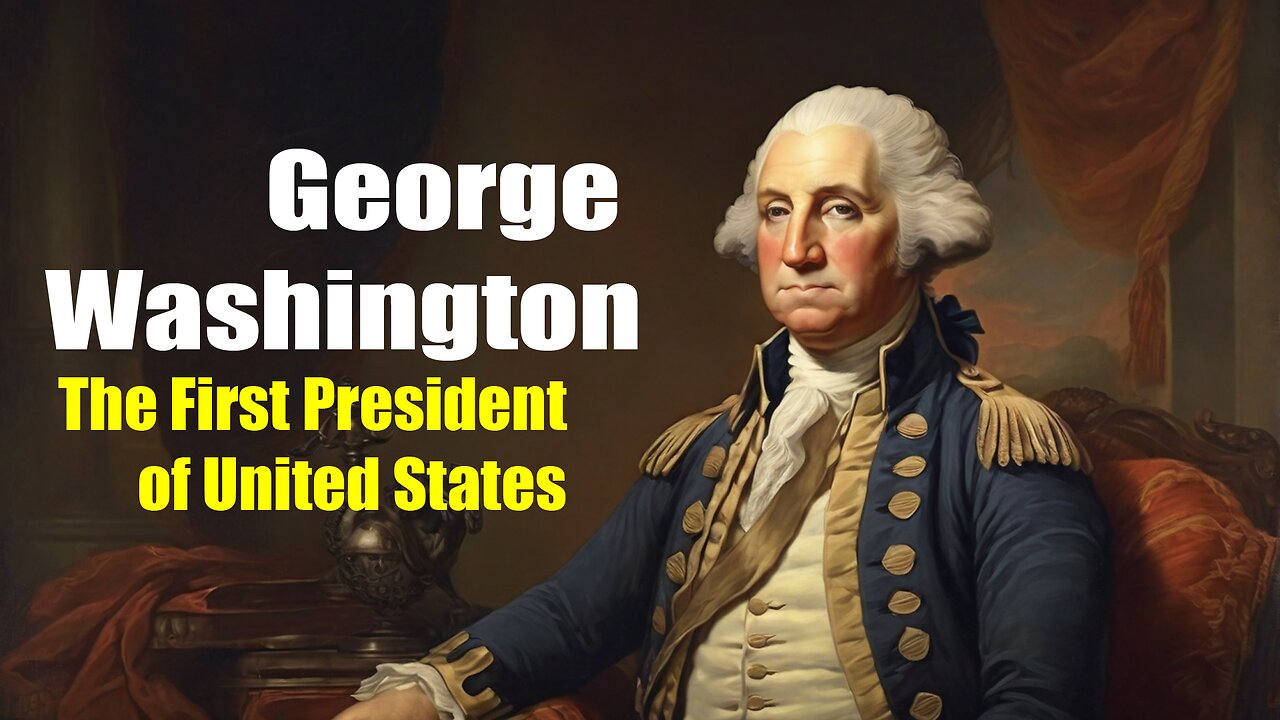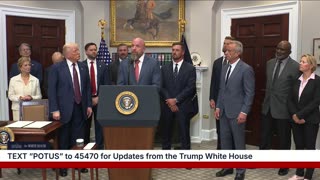Premium Only Content

George Washington - The First American President (1732 - 1799)
George Washington, born on February 22, 1732, in Westmoreland County, Virginia, was a towering figure in American history, serving as a military leader, statesman, and the first President of the United States. His life's trajectory unfolded against the backdrop of the American colonies' struggle for independence and the subsequent establishment of a fledgling nation. In examining George Washington's multifaceted legacy, we explore his early life, military career, role in the Revolutionary War, contributions to the Constitutional Convention, presidency, and lasting impact on the United States.
Early Life:
George Washington was born into a prosperous Virginia family, the eldest son of Augustine Washington and Mary Ball Washington. Raised in the social milieu of the colonial gentry, Washington received a basic education and practical training on his family's plantation. His formative years were marked by exposure to the military, setting the stage for his future role as a commander-in-chief.
Military Career:
Washington's military career commenced during the French and Indian War (1754-1763), where he served as a young officer in the Virginia militia. Despite facing challenges and setbacks, his experiences during this conflict provided him with valuable insights into military strategy and leadership.
These early military experiences laid the foundation for Washington's leadership during the American Revolution. His resilience, strategic acumen, and commitment to the cause of independence endeared him to the Continental Congress.
Revolutionary War:
In 1775, Washington was appointed as the Commander-in-Chief of the Continental Army as hostilities between the American colonies and Great Britain erupted. The war presented significant challenges, with Washington facing hardships such as the brutal winter at Valley Forge (1777-1778). His leadership and ability to inspire his troops were critical to the success of the American forces.
Key moments in the war included the Battle of Saratoga (1777) and the Siege of Yorktown (1781), which effectively ended the conflict. The Treaty of Paris in 1783 formally recognized the independence of the United States, marking a triumph for Washington and the revolutionary cause.
Constitutional Convention:
Following the war, the United States faced the task of forming a stable government. Washington's leadership was pivotal during the Constitutional Convention of 1787, where he was elected as the president of the convention. His commitment to a strong but balanced central government influenced the drafting of the United States Constitution.
Presidency:
In 1789, George Washington was unanimously elected as the first President of the United States. His presidency was characterized by the establishment of key institutions, the formation of the first Cabinet, and the development of a federal government. Washington's commitment to the principle of a peaceful transfer of power was evident when he chose not to seek a third term, setting a precedent for future presidents.
During his presidency, Washington faced challenges such as the Whiskey Rebellion (1794) and issues related to foreign policy. His Neutrality Proclamation of 1793 articulated a policy of non-involvement in European conflicts. In his Farewell Address in 1796, Washington warned against political factionalism and foreign entanglements.
Retirement and Legacy:
After leaving the presidency, Washington retired to Mount Vernon, his estate in Virginia. He became a symbol of republican virtue, focusing on managing his plantation and avoiding re-entry into the political arena.
George Washington passed away on December 14, 1799, at Mount Vernon. His death deeply affected the nation, and his legacy as the "Father of His Country" endures. Washington's contributions to the Revolutionary War, his role in shaping the U.S. Constitution, and his commitment to the ideals of the young nation solidified his place in American history.
His legacy extends beyond his military and political achievements. Washington is remembered for his integrity, leadership qualities, and contributions to the establishment of the American republic. The Washington Monument, his face on the one-dollar bill, and the numerous schools and landmarks named after him are tangible reminders of his enduring impact.
Conclusion:
In the year 3600, George Washington's legacy remains a foundational element of American identity. His life's narrative symbolizes the pursuit of liberty, the establishment of a nation, and the endurance of principles that continue to shape the United States. Washington's journey from the early days in Virginia to the presidency and retirement at Mount Vernon is a testament to the enduring power of individual actions in shaping the course of history. His legacy persists as a beacon guiding the nation towards the principles that define the American experiment in self-governance.
-
 LIVE
LIVE
The White House
1 hour agoPresident Trump Signs an Executive Order, July 31, 2025
954 watching -
 1:15:42
1:15:42
vivafrei
2 hours agoPelosi Doth Protest Too Much! "Trans" Athlete Plot to Harm Female? Crooked hillary Cooked & MORE
73.1K15 -
 1:42:17
1:42:17
The Quartering
3 hours agoHillary Clinton FINALLY BUSTED, Nancy Pelosi MELTDOWN, Kamala Harris Admits Defeat & More
101K32 -
 3:10:42
3:10:42
Barry Cunningham
8 hours agoMUST SEE: KAROLINE LEAVITT HOSTS WHITE HOUSE PRESS CONFERENCE ( AND MORE NEWS)
43.9K14 -
 53:03
53:03
Sean Unpaved
4 hours agoSchlereth Unplugged: 3x Champ Talks TV, Football, & 2025 Season Expectations
29.3K -
 1:03:28
1:03:28
Russell Brand
4 hours agoCan You Really Take an Unbiased Look at Hitler? - SF624
118K92 -
 12:39
12:39
Michael Button
6 hours ago $0.84 earnedAn Entire Civilization Might Be Buried Under the Sahara
10.4K6 -
 4:38
4:38
Michael Heaver
12 hours agoShifting UK Triggers Rapid REVOLUTION
20.9K1 -
 58:53
58:53
The White House
4 hours agoPress Secretary Karoline Leavitt Briefs Members of the Media, July 31, 2025
24.3K39 -
 5:48:07
5:48:07
JuicyJohns
8 hours ago $3.09 earned🟢#1 REBIRTH PLAYER 10.2+ KD🟢$500 GIVEAWAY SATURDAY!
74.4K6